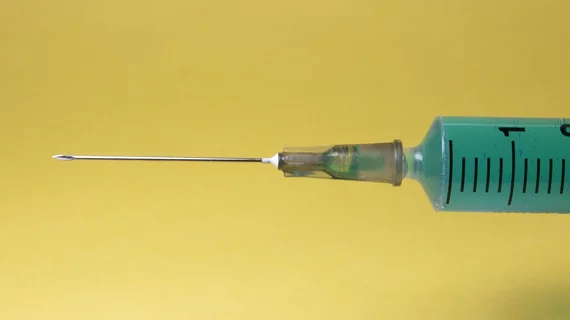A universal flu vaccine may be closer after a new trial got underway to test immune responses.
Phase 1 of a clinical trial of a new influenza vaccine has begun at the National Institutes of Health (NIH) Clinical Center in Bethesda, Maryland. The vaccine, BPL-1357, was developed by researchers at the National Institute of Allergy and Infectious Diseases (NIAID). The trial is placebo controlled and a single site, enrolling up to 100 people aged 18 to 55 years. NIAID investigator Matthew J. Memoli, MD, is leading the trial.
The trial culminates the long-held desire for a universal flu vaccine. Each year, seasonal influenza vaccines are designed to protect against the four main strains of flu Type A and B viruses, with scientists leveraging research to estimate which are most likely to spread and cause illness during that flu season. However, the flu vaccine doesn’t cover all influenza strains. A universal vaccine would offer broader and longer-lasting protection against seasonal flu viruses and new flu viruses.
The BPL-1357 is made up of four strains of non-infectious, chemically inactivated, low-pathogenicity avian flu virus. The vaccine was tested in mice and ferrets with positive results.
“Influenza vaccines that can provide long-lasting protection against a wide range of seasonal influenza viruses as well as those with pandemic potential would be invaluable public health tools,” NIAID Director Anthony S. Fauci, MD, said in a statement. “The scientific community is making progress on this pressing global health priority. The BPL-1357 candidate influenza vaccine being tested in this clinical trial performed very well in pre-clinical studies and we look forward to learning how it performs in people.”
The trial participants will be randomized into three groups and receive two doses of placebo or vaccine spaced 28 days apart. Group A will receive the BPL-1357 intramuscularly along with intranasal saline placebo. Group B will receive doses of the candidate vaccine intranasally along with intramuscular placebo. Group C will receive intramuscularly and intranasally delivered placebo. The study participants nor the study clinicians will know the group assignments. Volunteers must also not receive any type of flu vaccine in the eight weeks prior to enrollment and agree to forego seasonal flu vaccination for approximately two months after the second vaccine or placebo dose.
The study will last approximately seven months for each participant, involving two clinic visits to receive the vaccine, as well as seven clinic visits to provide blood and nasal mucosal samples investigators can use to detect and characterize immune responses.
“With the BPL-1357 vaccine, especially when given intranasally, we are attempting to induce a comprehensive immune response that closely mimics immunity gained following a natural influenza infection,” Memoli said in a statement. “This is very different than nearly all other vaccines for influenza or other respiratory viruses, which focus on inducing immunity to a single viral antigen and often do not induce mucosal immunity. Our study will examine the safety of BPL-1357 and also will allow us to assess the importance of mucosal immunity against flu and whether a strategy of inducing both the cellular and antibody arms of the immune system can provide broader protection against the ever-changing influenza virus.”

